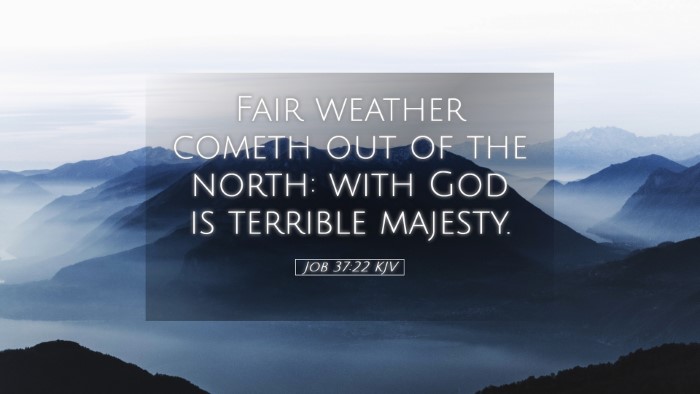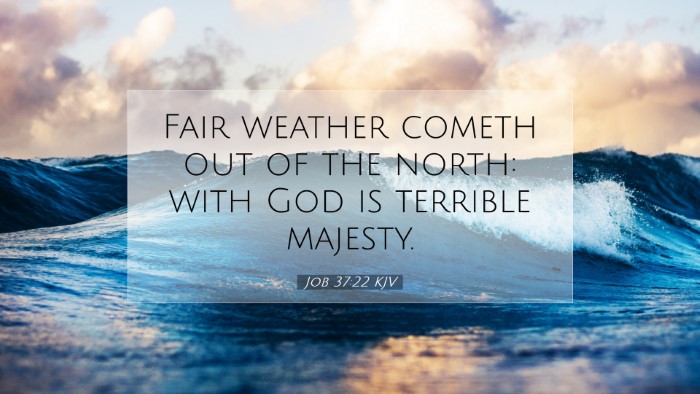Old Testament
Genesis Exodus Leviticus Numbers Deuteronomy Joshua Judges Ruth 1 Samuel 2 Samuel 1 Kings 2 Kings 1 Chronicles 2 Chronicles Ezra Nehemiah Esther Job Psalms Proverbs Ecclesiastes Song of Solomon Isaiah Jeremiah Lamentations Ezekiel Daniel Hosea Joel Amos Obadiah Jonah Micah Nahum Habakkuk Zephaniah Haggai Zechariah MalachiJob 37:22
Job 37:22 KJV
Fair weather cometh out of the north: with God is terrible majesty.
Job 37:22 Bible Commentary
Commentary on Job 37:22
Job 37:22 states: "Fair weather cometh out of the north: with God is terrible majesty." This verse, derived from a profound discourse on God’s sovereignty and power, encapsulates the majesty of God as revealed through nature and the elements.
Introduction
In this verse, we find an intricate understanding of divine meteorology that goes beyond mere weather patterns. It aligns the majesty of God with the phenomena observed in creation, especially as discussed in the preceding verses by Elihu, who presents a powerful reflection on God's omnipotence and the wonders of His works.
Theological Insights
- The Origin of Fair Weather: The phrase "Fair weather cometh out of the north" points to the direction from which clear and calm weather often arises. In the ancient Near Eastern thought, the north was often associated with the realm of the divine. This signifies that the good and beneficial aspects of weather are attributed to God's sovereign will.
- Divine Sovereignty: The text emphasizes God's control over the elements. The precise direction of fair weather suggests that no aspect of the natural world is beyond God's governance. This teaches us about the comprehensive nature of God's rule over creation, and reaffirms the principal theological understanding that every good and perfect gift comes from above (James 1:17).
- Terrible Majesty: The concluding phrase, “with God is terrible majesty,” portrays a dual aspect of God's character - His majesty evokes both reverence and fear. This evokes a recognition of the awesome nature of God, whose very presence embodies power and holiness. The term "terrible" can be understood as awe-inspiring, reminding believers of the appropriate response of worship and submission to God.
Exegesis and Contextual Analysis
The verse sits within a larger discourse where Elihu is articulating a defense of God's justice and a reminder of God's role as Creator. The context speaks to the discourse on divine providence as it relates to human suffering. Job, in his anguish, had called into question the justice of God; here, Elihu redirects the focus toward God's might and the beauty of His design in creation.
Role of Nature in Revelation
Nature serves as a means by which faith and understanding in God’s character are cultivated. As noted by Matthew Henry, the storms and weather patterns reflect the awe-inspiring nature of God. They are not barren symbols but instead vibrant reminders of God's presence and involvement in the minutiae of life.
Understanding the North Wind
The specific mention of the north wind is noteworthy. In the ancient context, winds were understood as carriers of blessings or curses, and thus their direction was significant. Barnes points out that "the north wind" often correlates with cold and hard weather, yet it brings fair weather as well. This paradox illustrates how God can bring forth good from adverse circumstances, reinforcing the theme of restoration and hope found throughout the book of Job.
Practical Applications
Understanding this verse can provide believers with profound encouragement. In tumultuous times, when circumstances appear bleak, it is vital to remember that God is sovereign and His majesty encompasses all situations, both calm and stormy.
- Trust in Divine Sovereignty: Believers are invited to place their trust in God’s sovereignty. Just as the changing seasons and weather patterns are under His control, so too are the challenges faced in life.
- Awe and Reverence: The acknowledgment of God's "terrible majesty" encourages worship that stems from a place of recognizing who God is. This fosters a deeper relationship with the divine, rooted in respect and love.
- Hope in Adversity: Just as fair weather follows storms, believers can find hope in knowing that divine purposes are at work even in their struggles. God's nature assures us that He is a source of goodness and mercy.
Conclusion
Job 37:22 provides an essential glimpse into the character of God and His interaction with the world He created. The verse offers a framework for understanding the interplay between divine authority, natural phenomena, and human experience. As pastors, students, and theologians reflect on these insights, they can draw from the depths of God's Word, finding both strength and wisdom in the beautiful unity of divine majesty and natural revelation.


